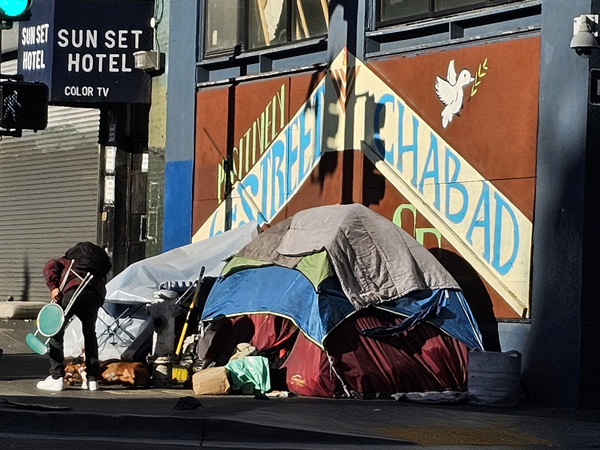California cleans up homeless encampments

[A homeless encampment in San Francisco. Photo Credit: Yujun Lee]
The state of California began cleaning up homeless encampments throughout the state following Governor Gavin Newsom’s executive order.
The executive order, issued on July 25, 2024, directed state agencies to address and clean up homeless encampments at the local level while providing support to the individuals living in them.
According to the California governor website, the state has invested over one billion dollars in encampment resolution grants for its cities and counties, contrasting to providing no resources at the state level in the past.
In a video posted on the governor's website, Newsom said, “It’s time to move with urgency at the local level to clean up these sites, to focus on public health, and focus on public safety.”
Over the past few decades, homelessness has grown to become a major issue that the state of California is facing.
Now, it has become an urgent issue that the state must combat and solve.
According to the United States Department of Housing and Urban Development’s estimation in January 2023, there are more than 181,399 people experiencing homelessness in California.
This is the highest number of homeless people in the nation, followed by New York and Florida.
Previously, it was difficult to address homelessness and clean up the encampments because there was no legal way to force individuals out of their camps.
That was due to the Supreme Court decision in the 1962 case Robinson v. California, which held that the criminalization of a person’s status goes against the Eighth Amendment to the United States Constitution, which prohibits cruel and unusual punishments.
However, the recent Supreme Court decision in City of Grants Pass v. Johnson, which ruled 6-3 with the conservative justices in the majority on June 28, 2024, changed everything.
The court held that imposing civil and criminal penalties on people camping on public land is not considered “cruel and unusual punishment,” as prohibited by the Eighth Amendment.
As a result, this decision removed legal barriers preventing state and local governments from driving homeless people out of their camps, and it led Governor Newsom to issue the executive order.
However, as California is a historically liberal state and all liberal justices dissented from the majority opinion in the Supreme Court case, Newsom’s order faced wide criticism from his supporters.
Some counties, such as Los Angeles County, opposed Newsom’s order, stating that the county will not criminalize anyone at encampments but will rather continue providing support.
Los Angeles Mayor Karen Bass, opposing the criminalization of camping on public land to hide the homelessness crisis, stated, “Neither will work, neither will save lives and that route is more expensive for taxpayers than actually solving the problem.”
Although there is some opposition, such as San Francisco county, decided to follow the order and plan to clean up homeless encampments.
With clashing responses to the order, Governor Gavin Newsom’s plan to clean up California seems to be moving forward.

- Yujun Lee / Grade 11
- Homestead High School

![THE HERALD STUDENT REPORTERS [US]](/assets/images/logo_student_us.png)
![THE HERALD STUDENT REPORTERS [Canada]](/assets/images/logo_student_ca.png)
